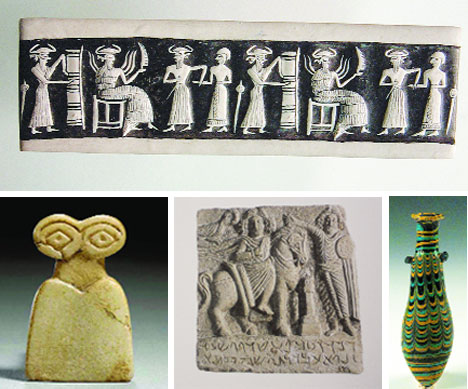Turkey turns blind eye to plunder, says Syria

Red-Listed Syrian objects ranging from pre-history to the Ottoman period
Syria has accused Turkey of turning a blind eye to the systematic looting of the country’s cultural heritage. Illicit digging at archaeological sites is “fierce”, antiquities stores have been raided by armed gangs, and foreigners, from Turkey in particular, are smuggling hundreds of objects across its borders, Syria claims.
The Syrian department in charge of antiquities and museums has published a report documenting the destruction of its heritage. The looting goes far beyond opportunistic theft. Last October, for example, in Hergla in northern Syria, around 100 armed men targeted a store of finds from sites in Raqqa province. Hundreds of artefacts, including mosaics and pottery, were stolen. At the time, Raqqa was held by jihadists who were disowned even by some al-Qaeda fighters.
Lack of co-operation
Syria has recovered some artefacts that were smuggled across its western border with Lebanon. But the 900km-long border to the north with Turkey is more problematic, a situation exacerbated by the mutual antipathy between Ankara and Bashar al-Assad’s regime. “The Turkish government has shown no interest in controlling its borders or co-operating to restitute what was taken away,” says the antiquities department’s website.
Turkey’s Cultural Heritage and Museums General Management directorate would not answer specific questions about seized artefacts or comment on the Syrian complaint about a lack of co-operation. Instead, it issued a statement that says: “The necessary checks and controls are taken at the [Turkish] border at all times.” It also says that artefacts seized in Turkey are put on an official register and “will be returned to the country of origin in accordance with the laws of Turkey and international laws”.
The Syrian report says that Lebanon is co-operating. Last August, Lebanon returned 18 mosaics—one of which depicts scenes from Homer’s Odyssey—that were seized by Lebanese customs in October 2012.
In Idlib, in north-western Syria, looters are stealing from archaeological sites “in an orderly fashion”, the local community has told the department. “Antiquities dealers and smugglers, Syrians and non-Syrians, Turkish in particular, are in the region,” the report says. Lebanese antiquities dealers are said to be active in Damascus.
In the ancient city of Dura-Europos, the report says, “almost 300 people are excavating intensively”, and an estimated 80% of the site known as the “Pompeii of the Syrian desert” has been affected. The report says that “fierce” activity began there after a gold bracelet was found in September.
Cheikhmous Ali, a Syrian archaeologist based in France, says that he is saddened but not surprised. “It is easy to hide small objects [going] through the checkpoints to Lebanon, Turkey, Jordan and Iraq,” he says. “The authorities in these countries struggle against the Mafia and the trafficking of antiquities.” Ali says that he was in Mardin, a Turkish city near the Syrian border, last month and saw hundreds of objects being seized by the Turkish police from Syrian and Turkish looters. The police force in Mardin says in a statement that it has seized 335 ancient objects.
Francesco Bandarin, Unesco’s assistant director-general for culture, said last month that “a very, very small amount of what has been pillaged” has been intercepted. He announced in New York that Unesco will use €2.5m from the European Union to help neighbouring countries tackle the trafficking of looted antiquities.
Those who are smuggling Syrian antiquities into neighbouring countries are probably using the same routes as the arms and drugs trade. No one knows for certain the objects’ final destinations. Emma Cunliffe, a postgraduate associate from Durham University who has been monitoring Syria, says: “The chances are that it will be decades before we know what happens to these looted works.” She says there appears to be a growing interest in these types of antiquities in the Gulf states. Mamoun Fansa, a Syrian-born, Berlin-based archaeologist and the author of a book about the destruction of Aleppo’s heritage, says he has heard that a mosaic from the museum in Hamma, central Syria, has been spotted in the Gulf.
The Italian archaeologist Paolo Matthiae, who has worked in Syria since the 1960s and is part of an international campaign that launched in Rome last month, says: “Organised groups of diggers have been reported in sites throughout the Euphrates Valley.” The looted objects can end up anywhere on the international market, he says. “Collectors have to be very careful in checking provenance papers, which are often skilfully forged.”
Additional reporting by Ermanno Rivetti
By Javier Pes and Emily Sharpe. News, Issue 255, March 2014
Source: http://www.theartnewspaper.com